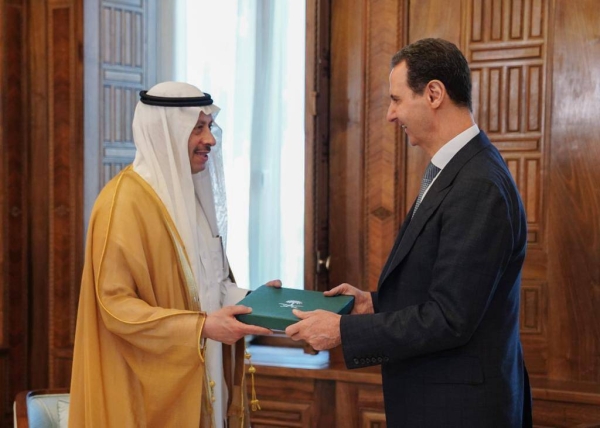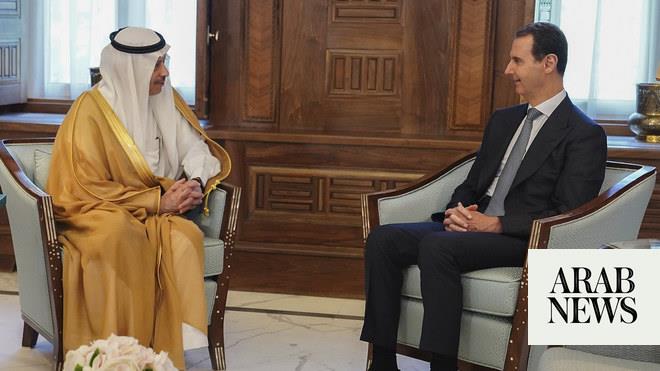
Residential buildings and vehicles targeted by Israeli airstrikes
Israeli army claims to have destroyed underground Hezbollah structures in the south
BEIRUT: The caretaker prime minister of Lebanon, Najib Mikati, received an invitation on Tuesday from King Salman bin Abdulaziz to participate in the extraordinary joint Arab-Islamic summit scheduled for Nov. 11 in Riyadh.
The summit will address Israeli assaults on the Palestinian people and Lebanese territories, coinciding with an increase in Israeli drone strikes in Beirut, southern Lebanon and Bekaa, resulting in further civilian casualties.
Mikati received the invitation from Waleed Bukhari, the Saudi ambassador to Lebanon.
The invitation stated that participation in the summit is a “reaffirmation of Arab and Islamic solidarity in efforts to halt Israeli aggression and to promote the pursuit of a just resolution to the Palestinian issue, ensuring the rights of the Palestinian people to establish their independent state with East Jerusalem as its capital.”
Israel’s ground war in has completed its 44th day, and the toll since Hezbollah opened the southern front 13 months ago exceeds 3,000 dead and more than 13,000 wounded.
As the assaults diminished in the southern suburbs of Beirut, residents had the chance to inspect their homes and retrieve whatever belongings they could. However, the confrontations remained intense in the southern regions, and airstrikes continued in the south and in the Bekaa region.
Two Israeli airstrikes targeted the Jiyeh area, 28 km south of Beirut, killing a woman and wounding seven people — who were taken to Sibline Governmental Hospital.
Airstrikes hit a building near Sheikh Ragheb Harb Hospital in Toul, and a shop in Jwaya. An airstrike on the outskirts of Bazouriyeh caused injuries, while four people were killed in an Israeli airstrike in the town of Baflieh in the Tyre district.
An elderly woman, Ghadia Al-Suwaid, who had insisted on staying in her home in the border town of Al-Dhayra Al-Fawqa, was suspected to have been kidnapped by Israeli soldiers. The woman’s relatives told the National News Agency that “they entered the town in the morning and did not find her.”
Meanwhile, a Red Cross convoy, in coordination with UNIFIL, headed to Wata Khiam, also on the border, to complete the recovery of 15 bodies from rubble after airstrikes hit their home eight days ago.
The Red Cross retrieved five bodies two days ago, but larger machinery was needed to continue clearing the rubble.
An airstrike on the town of Deir Kifa killed two people and wounded several others.
Israeli military vehicles were seen advancing at the Shebaa Farms toward Al-Sadana heights and Shebaa Gate, where clashes were reported between Israeli forces and Hezbollah members.
On Tuesday morning, Israeli forces tried to infiltrate Rmeish but were forced to retreat after clashes with Hezbollah fighters, while in Haris an unknown motorcyclist was killed in an Israeli airstrike.
In Bekaa, an Israeli drone targeted a car on the road between Hortaala and Talia, carrying a displaced family from Baalbek. The raid killed three siblings, Nathalie, Raed and Mohammed Naji Dandash, and wounded their mother, Iman Fawzat Habib, who was transferred to Dar Al Amal University Hospital.
Hezbollah claimed to have struck “a gathering of Israeli soldiers in Doviv and Ma’ale Golani barracks, and another … in the hills of Kfar Shuba. We bombed an explosives factory in Hadera, south of Haifa, with a salvo of qualitative missiles.”
Israeli army spokesperson, Avichay Adraee, meanwhile, claimed that Israeli forces had destroyed “an underground infrastructure of about 70 meters long and confiscating weapons and rocket launchers in rugged and underground areas in southern Lebanon.”








